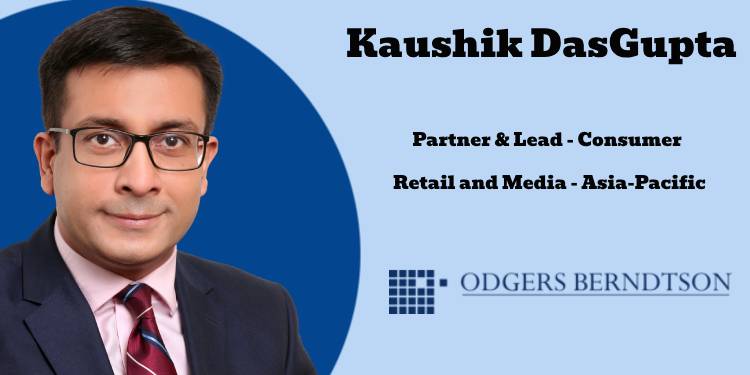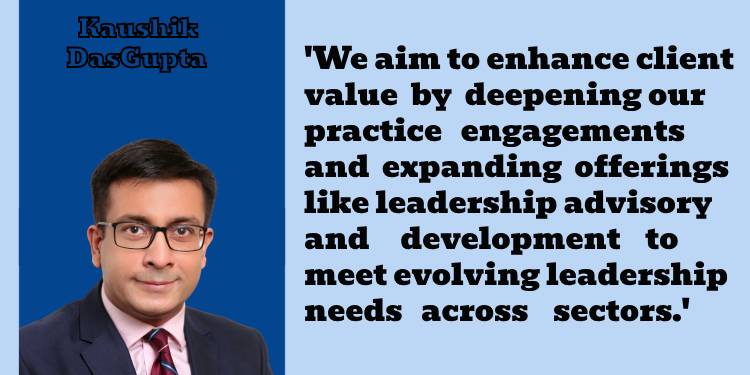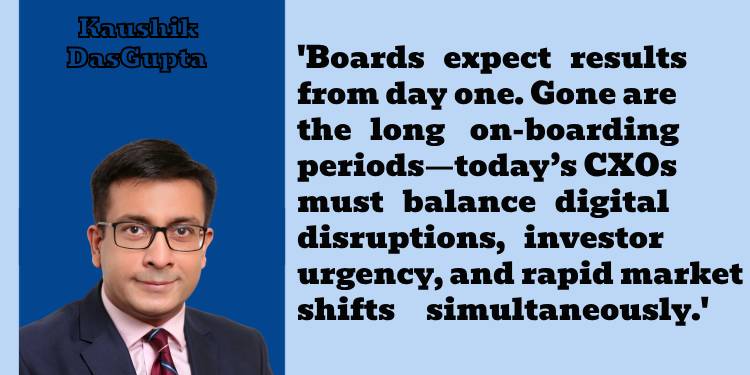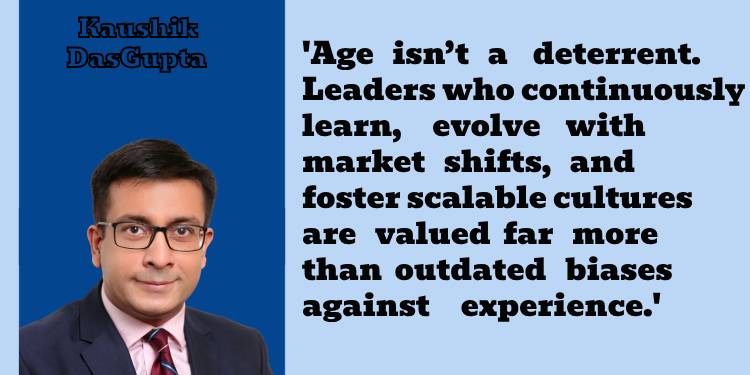
Age isn’t a barrier, what matters is a leader’s results and organizational skills: Kaushik DasGupta, Odgers Berndtson
Odgers Berndtson is a global executive search and leadership advisory firm, headquartered in London UK, with over 58 offices & operations across 32 countries. It has been ranked as the top 6th among leading executive search firms globally. For over 50 years, Odgers Berndtson has helped organisations all over the world find senior talent to drive their business agendas.
This includes international leadership hiring assignments such as the Organising Committee for the 2032 Olympic & Paralympic Games in Brisbane, Sporting Director for Newcastle United Football Club, CEO of Integrated and Specialist Medicine Clinical Group, part of the UK NHS Foundation Trust, to name a few. In India, its services include board appointments, leadership & board advisory services and executive search at the leadership level. Its focus in India is on the Industrial, Consumer, Technology & Education sectors where we work with both Indian & as well as foreign multinationals. It also assists clients identify & hire exceptional leadership talent to drive their sustainability & DE&I initiatives.
Medianews4u.com caught up with Kaushik DasGupta, Partner & Lead – Consumer, Retail and Media – Asia-Pacific Odgers Berndtson.
Q. What goals does Odgers India have for 2025 and what is the gameplan to get there?
Odgers India’s strategy is twofold: enhancing client value through deeper involvement in more practices and expanding our product offerings, such as leadership advisory and leadership development.

Q. How does your role elevation align with Odgers broader growth strategy for the Asia-Pacific region?
I’m excited that my new role leading Odgers Asia-Pacific Consumer Practice comes at a time when the firm is investing heavily in this region. We are bringing in new senior leaders and deepening our footprint throughout APAC because we see enormous potential in the Asia-Pacific market.
When discussing the five ASEAN economies, Singapore and Malaysia boast high per-capita incomes and a mature retail sector, driving strong demand for luxury goods and premium services. Indonesia and Thailand fall into the fast-growth middle; their rising middle classes are eager to invest in lifestyle brands, even as price remains a key consideration for many.
In the Philippines, much like in India, rapid GDP growth continues, but lower average incomes mean consumers prioritise affordable, value-for-money products.
We also see that, especially in India, there is a sizable consumer group with consumption patterns similar to those in Singapore, aggressively driving the demand for premium and luxury goods.
The potential offered by APAC as a diverse market landscape is precisely why both Indian and global MNCs are looking to expand and scale their operations. At Odgers, we have the experience and expertise to partner with them for their leadership requirements.
Q. The consumer and retail landscape in APAC is rapidly evolving. What key trends do you foresee shaping leadership demands in this sector over the next 3–5 years?
Over the next three to five years, the following leadership demands will emerge in the sector:
1. Leaders who are digitally savvy, those who understand technology as the backbone of the business, will be in demand. Leaders with experience in handling data and digital channels to craft seamless, personalised experiences, optimise operations, and stay ahead of the competition will have competitive advantage.
2. Equally important will be leaders with multicultural and geopolitical fluency. Being a successful leader in Asia depends on one’s ability to navigate subtle cultural nuances, local regulations, and shifting trade dynamics.
Those who have lived and worked across multiple countries will possess the contextual understanding necessary to manage diverse teams and tailor strategies to each market.
3. High emotional intelligence has become a non-negotiable leadership trait. As workplaces become more inclusive and fluid, leaders who listen, foster trust, and inspire through purpose will outperform those who rely solely on command-and-control approaches.
4. Finally, the traditional leadership talent pipeline is expanding. In the past, many CEOs and business leaders in the consumer sector came from sales and marketing backgrounds.
However, with the rise of e-commerce and omnichannel retail, professionals from finance, manufacturing, and supply chain are now stepping into top roles. We are witnessing a shift in which manufacturing leaders who also possess strong product knowledge and digital skills, can be seen just as effective in running a business as those with a marketing background.

Q. Odgers Media and Entertainment Practice is designed to discover transformational global leaders across the C-suite. Are these leaders in short supply?
Yes, the media and entertainment world has transformed rapidly in the last decade. We’ve moved from traditional TV and print to streaming platforms, social media, and other digital mediums.
This sector needs leaders who can see the big picture, understand emerging technologies, and develop people alongside them—all at once. These combined skills are rare. In short, yes they are in short supply.
Q. Are CXOs under pressure to deliver results with a shorter timespan compared to a decade ago in businesses like media and entertainment, retail? Has job pressure dramatically shot up for CXOs?
Yes, CXOs are catering to far more pressing demands than their counterparts did a decade ago. Back then, new leaders were often afforded a settling-in period to assess challenges and lay out long-term strategies. Now, boards and investors expect immediate strategic clarity and measurable outcomes from day one.
Executives are now navigating customer trends, AI-driven disruptions, evolving business models, pandemic after-effects, and geopolitical risks. High-stakes investments, combined with razor-thin margins for error, have exacted a clear toll. Average CEO tenures have dropped from roughly eight to ten years a decade ago to under four years today.
Q. In the media sector, what are the trends shaping hiring practices? Is gaming the big opportunity for leaders in media and entertainment?
Gaming has quietly emerged as one of the bigger growth engines in India’s entertainment industry. The domestic market has exploded since 2021, with the annual revenue of the gaming sector growing by upwards of 25% each year. India currently has over 500 million active gamers, representing a significant consumer base.
The country is both a consumer and an exporter of talent in the gaming industry. Cities like Bangalore, Hyderabad, and Delhi-NCR have become indispensable for game development, 3D modelling, animation, and graphic design.

Q. With consolidation in media and entertainment, a lot of executives over the age of 45 are being shown the door. Do their age, experience and salary often work against them in getting a new role?
Age itself isn’t a barrier; what counts is a leader’s ability to deliver results and build organisational capabilities. Their track record in mentoring talent, fostering agile, cross-functional teams, and embedding scalable processes is of immense value.
Demonstrating a commitment to lifelong learning—adopting emerging technologies and aligning business demands with ever-changing market dynamics—are highly valued traits. In short, competencies trump biases.
Q. Who are some of key hires that Odgers has made for media and entertainment companies?
Due to strict confidentiality agreements with our clients, we are unable to share the details.
However, we have recently placed several candidates as CEOs, Chief Revenue Officers, Chief Digital Officers etc. for media & entertainment companies.
Q. Could you shed light on the company’s executive coaching and mentorship activities?
We provide best-in-class, tailored solutions supporting leadership development and assessment, CEO and executive succession planning services.
Our programmes include leadership cohort development, executive coaching, new leader integration and board effectiveness to ensure that senior executives reach their full potential.

Q. When CEO leaves do media and entertainment companies look at internal candidates or do they go outside? What role does confidentiality usually play?
CEO successions are a blend of internal and external talent search. Organisations value the institutional knowledge and cultural fit of existing leaders, yet often they need fresh capabilities or perspectives to fulfil their strategic ambitions.
Confidentiality is paramount, particularly in planned separations because a discreet process preserves stakeholder confidence, protects internal morale, and minimises reputational risk. At Odgers, we specialise in designing and executing confidential successions.
We begin by collaborating closely with our clients to understand their future vision and outline the required leadership profile. Where the necessary competencies aren’t present internally, we broaden our search externally to identify the ‘best talent’ suited for the role.
By engaging external candidates under a tightly controlled confidentiality protocol, media and entertainment companies can secure the right CEO & other leaders without disrupting day-to-day operations or diluting their brand position.

